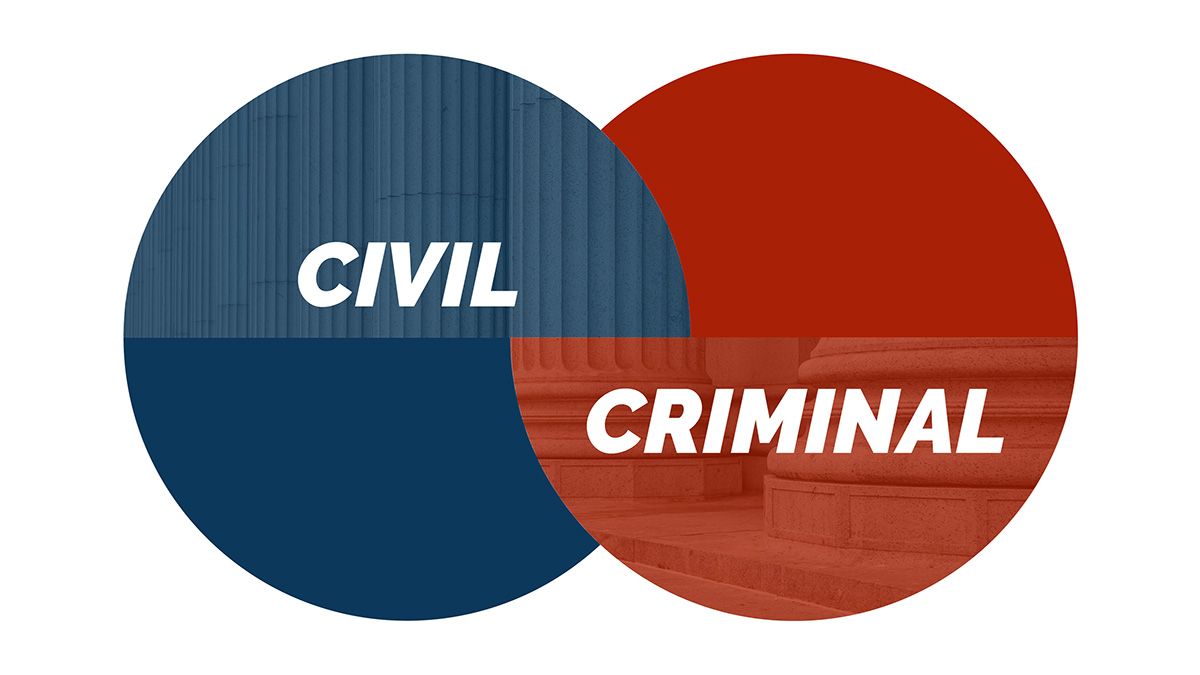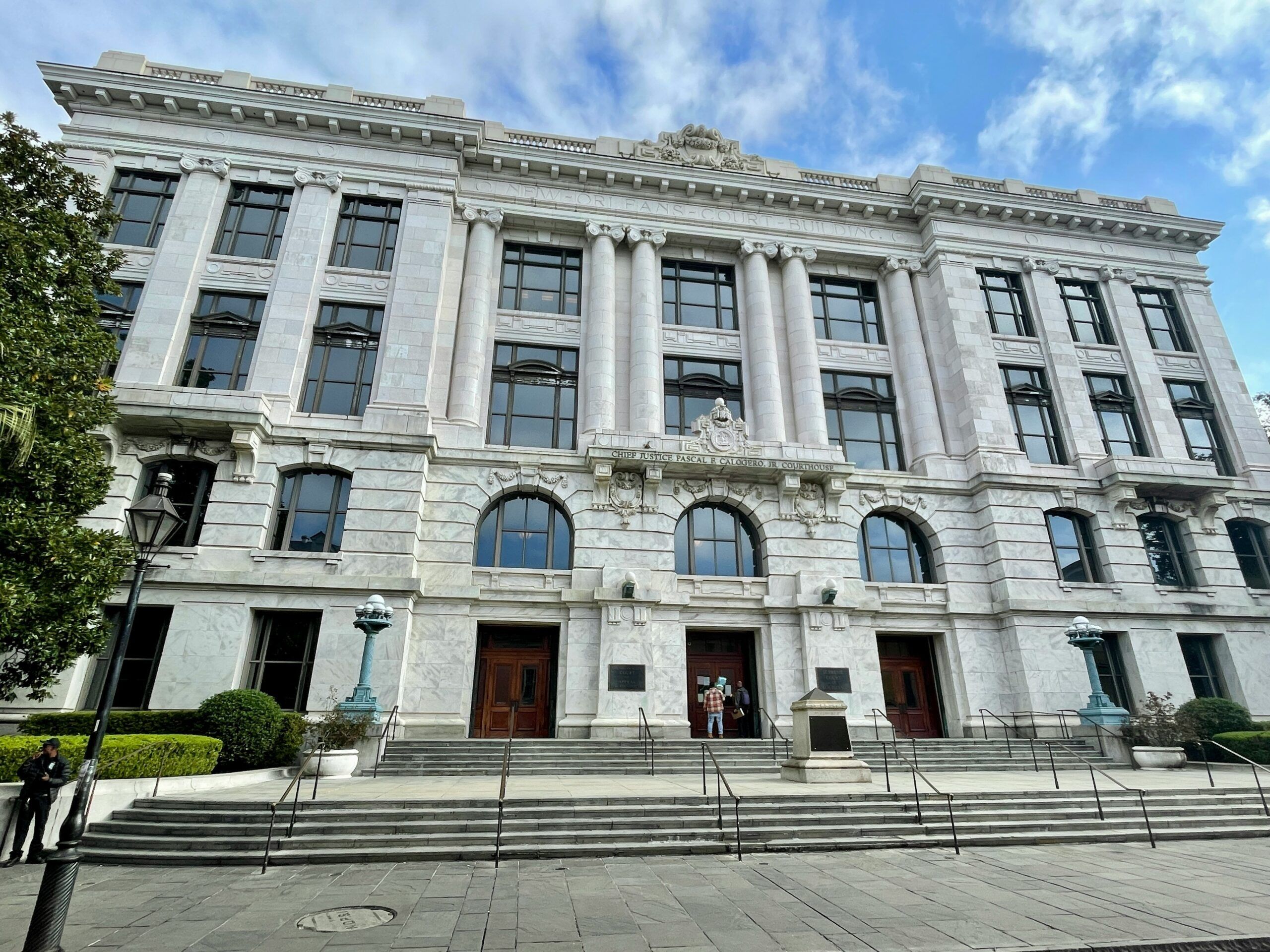Featured Topic
No Quid Pro Quo: Settling Civil Claims While Criminal Charges Are Pending
By Guest Author J. Nick Badgerow[1]
I. INTRODUCTION – OVERVIEW
While it is thankfully not a common situation, civil claims sometimes do arise as a result of alleged criminal conduct. This leads to a civil lawsuit against a defendant and a related, parallel — but unconnected — criminal charge against the same defendant, arising from the same common nucleus of operative facts.
Parties to civil litigation are generally free to settle existing or potential claims. This freedom to settle can yield many benefits: it alleviates the public and private costs of civil trials, eliminates the uncertainty and delay of litigation, and allows parties, through contract, to negotiate the remedies they desire. Settlement provides parties to a dispute a high degree of autonomy in resolving their affairs. This is why settlement is consistent with the public policy.[2]
The defendant presumably wants to settle the civil case, but understandably would be disinclined to pay, or at least would be motivated to pay less than full value to settle, a civil claim with the threat of the ongoing criminal charge over his/her head. Thus, negotiations to settle both cases, rather than just the civil case alone, would be beneficial.
By the same token, a civil plaintiff must realize that s/he is in a position to demand more if the settlement of the civil case could be coupled with a dismissal of the criminal charge. Certainly, the civil case would appear to be all the stronger because of a related criminal prosecution.
For these reasons, settlement of the civil case benefits each side, and allows each party to control his/her own destiny.
II. SITUATIONS
These issues arise in a number of situations. For example, a police officer involved in a shooting may be sued civilly for damages for injuries suffered by the alleged victim, while simultaneously being criminally charged by the government for excessive use of force. A truck driver may be sued civilly for involvement in a vehicular accident, while also being prosecuted in criminal court for driving under the influence of alcohol and reckless driving. A property owner may be sued civilly for allegedly causing personal injury to an invitee due to a defective condition of the property, while facing criminal charges for maintaining an unsafe public property arising from the same defective condition.
In each case, the defendant is more motivated to settle the civil case if the criminal case would also go away. The plaintiff is motivated to settle the civil case to maximize his/her financial recovery, and that recovery would presumably be enhanced if it could be coupled with a dismissal of the criminal case.
III. QUESTION AND SUMMARY ANSWER
So, the question arises: may the settlement of a civil case be coupled with a condition that the criminal case be dismissed? The answer is generally in the negative. While victims may agree to support dismissal or a favorable plea agreement, they may not agree, or be asked to agree, to refuse to testify or to withhold evidence in the criminal case.
IV. RULES AND LAWS
A. Rules of Professional Responsibility
Rule 3.4, Rules of Professional Responsibility[3], provides in pertinent part as follows:
A lawyer shall not:
(a) unlawfully obstruct another party’s access to evidence or unlawfully alter, destroy or conceal a document or other material having potential evidentiary value. A lawyer shall not counsel or assist another person to do any such act; . . .
(b) falsify evidence, counsel or assist a witness to testify falsely, or offer an inducement to a witness that is prohibited by law; . . . [or]
(f) request a person other than a client to refrain from voluntarily giving relevant information to another party unless:
(1) the person is a relative or an employee or other agent of a client; and
(2) the lawyer reasonably believes that the person’s interests will not be adversely affected by refraining from giving such information.
The Restatement of the Law Governing Lawyers similarly holds that a lawyer may not unlawfully induce or assist a prospective witness to evade or ignore process which obliges the witness to appear and testify.[4] Thus, it is improper and unethical for a lawyer to obstruct a prosecutor’s access to a witness’s testimony, offer an inducement to a witness not to testify, or request that a person refrain from testifying.[5]
B. Kansas Statutes
K.S.A 59-5904(2) provides:
(a) Interference with law enforcement is: . . .
(2) concealing, destroying or materially altering evidence with the intent to prevent or hinder the apprehension or prosecution of any person; . . .
K.S.A. 21-5909 provides in pertinent part:
Intimidation of a witness or victim; aggravated intimidation of a witness or victim. (a) Intimidation of a witness or victim is preventing or dissuading, or attempting to prevent or dissuade, with an intent to vex, annoy, harm or injure in any way another person or an intent to thwart or interfere in any manner with the orderly administration of justice:
(1) Any witness or victim from attending or giving testimony at any civil or criminal trial, proceeding or inquiry authorized by law; . . .
(b) Aggravated intimidation of a witness or victim is intimidation of a witness or victim, as defined in subsection (a), when the: . . .
(5) Act is committed for pecuniary gain or for any other consideration by a person acting upon the request of another person.
C. Missouri Statute
575.270.1, RSMo provides:
A person commits the crime of tampering with a witness if, with purpose to induce a witness or a prospective witness to disobey a subpoena or other legal process, or to absent himself or avoid subpoena or other legal process, or to withhold evidence, information or documents, or to testify falsely, he:
(1) Threatens or causes harm to any person or property; or
(2) Uses force, threats or deception; or
(3) Offers, confers or agrees to confer any benefit, direct or indirect, upon such witness; or
(4) Conveys any of the foregoing to another in furtherance of a conspiracy.
D. Federal Statutes
18 U.S.C. §201(c) provides:
(c) Whoever . . .
(2) directly or indirectly, gives, offers, or promises anything of value to any person, for or because of the testimony under oath or affirmation given or to be given by such person as a witness upon a trial, hearing, or other proceeding, before any court, any committee of either House or both Houses of Congress, or any agency, commission, or officer authorized by the laws of the United States to hear evidence or take testimony, or for or because of such person’s absence therefrom;
(3) directly or indirectly, demands, seeks, receives, accepts, or agrees to receive or accept anything of value personally for or because of the testimony under oath or affirmation given or to be given by such person as a witness upon any such trial, hearing, or other proceeding, or for or because of such person’s absence therefrom;
shall be fined under this title or imprisoned for not more than two years, or both.
42 U.S.C. §1985(2) provides:
(2) Obstructing justice; intimidating party, witness, or juror. If two or more persons in any State or Territory conspire to deter, by force, intimidation, or threat, any party or witness in any court of the United States from attending such court, or from testifying to any matter pending therein, freely, fully, and truthfully, or to injure such party or witness in his person or property on account of his having so attended or testified, or to influence the verdict, presentment, or indictment of any grand or petit juror in any such court, or to injure such juror in his person or property on account of any verdict, presentment, or indictment lawfully assented to by him, or of his being or having been such juror; or if two or more persons conspire for the purpose of impeding, hindering, obstructing, or defeating, in any manner, the due course of justice in any State or Territory, with intent to deny to any citizen the equal protection of the laws, or to injure him or his property for lawfully enforcing, or attempting to enforce, the right of any person, or class of persons, to the equal protection of the laws;[6]
Violation of this statute gives rise to a civil claim for damages and attorneys’ fees.[7]
V. WHAT CANNOT BE DONE?
A civil settlement agreement presumes that the plaintiff is getting something of value in exchange for giving up something of value in the form of claims or rights. An agreement not to cooperate in a criminal case gives up the victim’s/witness’ right voluntarily to provide the government and private parties with information about civil or criminal misconduct. But it also gives up the public’s right to the proper prosecution and punishment of crimes. Giving the victim a financial reward to induce noncooperation in a criminal case would therefore appear to be unethical under Rule 3.4, MRPC, and as well as unlawful under the statutes identified above.
Thus, a civil settlement could not ethically include a provision by which the settlement of the civil claim is made contingent upon the content of the testimony of the alleged victim or upon the outcome of the criminal case. Any terms that result in a witness’s refusal to testify or the withholding of factual information from the court would be improper.
Of course, one wonders how many civil settlements do include such a provision, resulting in dismissal of the criminal case, since the agreement presumably also includes a non-disclosure provision, meaning that no one outside the parties ever discovers it.
The policy is best expressed in the Missouri case of Ensminger v. Burton[8], which states:
A contract made with the purpose and upon the consideration that a criminal prosecution shall be suppressed, stifled or stayed, will not be enforced.
Many cases have reached the same conclusion, as to non-enforceability of settlement agreements, where any part of the payment was in consideration of hindering or suppressing criminal proceedings.
This issue was addressed by the Kansas Court of Appeals in the 1896 case of Ream v. Sauvain[9], where the defendant in a civil case gave a promissory note to the plaintiff in exchange for the promise of the plaintiff to dismiss the criminal case, and not to prosecute the defendant further on account of the alleged crime. The Court held the settlement to be void:
But, the prosecution having been instituted, the interests of the public demanded that it should be investigated, and not used in barter for the private gain of the [victim]; and his promise or agreement to stifle the prosecution furnished no valid consideration for the note, nor will the law aid him in its collection.[10]
Cases from other jurisdictions hold to the same effect.
- Jones v. Trump[11], (“[A]greements to refrain from assisting with a criminal prosecution violate public policy by undermining society’s criminal laws”).
- Wilson v. Singer Sewing Mach. Co.[12], (promissory note held void for illegality where partial consideration for note was agreement to suppress criminal prosecution).
- Franklin v. White[13], (“Agreements tending to impede the regular administration of justice are void as against public policy․ Contracts which unduly tend to influence the production or suppression of evidence are void.”),
- Ricketts v. Harvey[14], (“It is the duty of every person to exercise his influence in favor of the due enforcement of the criminal laws of the State, and no agreement to withhold such influence, or to employ it in such manner as to affect such prosecution, will be enforced.”).
- Utah Ethics Op. 99-06 (1999)[15] (neither prosecutor nor defense lawyer may seek agreement of police officer to ignore subpoena in defendant’s parallel civil case).
- Atwater v. Sellers[16], (“All agreements relating to proceedings in the courts, civil or criminal, which may involve anything inconsistent with the full and impartial course of justice therein, are void as against public policy.”).
- Aycock v. Gill[17], (promissory note given in exchange for an agreement to intercede with court to induce leniency violated public policy).
- Wheelock v. Commercial Nat’l Bank[18], (a contract based on suppression of criminal proceedings is illegal; the parties entering into the contract are in pari delicto, and neither party can have relief against the other).
- Prim v. Farmers’ Nat’l Bank[19], (where promise to forbear prosecution was part of consideration for promissory note, note contravened public policy and was illegal and unenforceable).
Thus, it is clear that payment to settle a civil case which includes an agreement on the part of the plaintiff to refrain from assisting or to forebear prosecution of a criminal case would be unethical, illegal and thus void, as would an agreement to withhold testimony or suppress the criminal proceeding.
A limited exception to this general prohibition is found in a California statute. Under this statute, the court can approve a civil compromise of a criminal misdemeanor charge. California generally adheres to the principles outlined above, and no compromise is permitted when:
- The act is committed against or by a police officer performing official duties;
- The act is done “riotously;”
- The defendant intended to commit a felony;
- The case involves domestic violence or a protective order; or
- The case involves elder or child abuse.
Otherwise, the civil settlement will result in dismissal of the criminal charge, though the victim must appear in court and say that s/he is satisfied with the compromise. The judge is not required to accept the compromise, but if the judge is satisfied with the compromise, then the case can be dismissed.[20]
VI. WHAT CAN BE DONE?
Avoiding all the foregoing proscriptions, victims may still agree to support dismissal or a favorable plea agreement in the criminal case, but may not be paid to agree to refuse to testify or to withhold evidence. The agreement must be clear that the settlement is not made to induce, require or result in the dismissal of the criminal charge, nor a refusal to testify or cooperate. The civil plaintiff may agree to advise the prosecutor of his/her satisfaction with the settlement and to request dismissal of the criminal case or approval of a plea agreement, but the negotiating parties must understand that prosecutorial discretion always rests with the prosecutor,[21] such that the criminal case may well proceed despite the payment, the settlement, and the victim’s request.
An ABA Opinion holds:
The Model Rules do not prohibit a lawyer from agreeing, or having the lawyer’s client agree, in return for satisfaction of the client’s civil claim, to refrain from presenting criminal charges against the opposing party as part of a settlement agreement, provided that such agreement does not violate applicable law.[22] (See ABA Formal Ethics Opinion 92-363. Cf. Michigan Ethics Opinion RI-78.)
For example,
the lawyer for a defendant in criminal and civil actions arising out of the same event may seek the cooperation of a crime victim on a plea agreement provided the settlement of the victim’s civil claim against the defendant is not contingent upon the content of the testimony of the victim or the outcome of the case.[23] (See North Carolina Ethics Opinion RPC 225.)
Further, it would appear to be appropriate for a settlement with the civil plaintiff to include a provision that the plaintiff not object to a plea agreement by the defendant in his/her criminal case.[24] (See North Carolina Ethics Opinion 98 FEO 19.)
VII. WHAT ABOUT THE REVERSE SITUATION?
In some cases, a criminal defendant is the plaintiff against the government in a civil case, such as where a defendant is arrested and prosecuted for criminal actions, but sues the government in civil court for police misconduct in connection with the arrest. In such a situation, may the government induce the criminal defendant to drop his/her civil case in exchange for the government’s dismissal of the criminal charge?
The government defendant in a civil case has far more power than the plaintiff. The pendency of criminal charges over the plaintiff’s head may help to induce him/her to drop a viable civil suit to get the criminal case dropped. For this reason, the United States Supreme Court has established specific factors for courts to consider in determining whether a civil rights release-dismissal agreement is valid.[25] Courts are to consider:
- Whether the agreement was voluntary (taking into account the plaintiff’s intelligence, education, experience, and sophistication level);[26]
- Whether the agreement contradicts the public interest (considering such things as conserving public fund, sparing possible trauma to potential witnesses, avoiding trial because crucial prosecution witnesses wouldn’t be able to testify)[27]; and
- Whether any prosecutorial misconduct was involved in the criminal case.[28]
- Favorable resolution of these issues should result in a valid agreement.
VIII. CONCLUSION
There is a strong public interest in the proper prosecution of crimes.[29] Successful criminal prosecutions depend on the testimony of available and reliable witnesses, especially victims. Paying off a victim to settle a case interferes with a criminal prosecution. That is why, as explained above, it is illegal in many situations, and unethical for lawyers to be involved, where crime victims are paid off in not to cooperate in the criminal proceeding, under the guise of settling their civil cases.
[1] J. Nick Badgerow is a partner with the firm of Spencer Fane LLP in Overland Park, Kansas. He has practiced civil litigation for more than 45 years in the state and federal courts of Kansas and Missouri. Nick was a member of the Kansas Judicial Council (24 years); member of the Kansas State Board of Discipline for Attorneys (16 years); member of the Kansas Supreme Court Commission on Professionalism; Chairman, Kansas Ethics 2000 Commission; Chairman, Kansas Ethics 20/20; Chairman, Kansas Bar Ethics Advisory Committee (14 years); Chairman, Johnson County Bar Association Ethics and Grievance Committee (29 years). Nick is co-author of the KBA Employment Law Handbook and an author and the editor of the KBA Ethics Handbook, Third Edition (2015). Nick has published more than 80 law review and law journal articles and presented more than 200 seminars, mostly on the subjects of attorney ethics, liability and professional responsibility. Nick received the Distinguished Service Award from the KBA in 2020.
[2] “The law favors the compromise and settlement of disputes, and when parties, in the absence of any element of fraud or bad faith, enter into an agreement settling and adjusting a dispute, neither party is permitted to repudiate it. (Lewis v. Kimball, 103 Kan. 173, 173 Pac. 279; and Massey-Harris Co. v. Horn, 132 Kan. 206, 294 Pac. 666.)” Nauman v. Kenosha Auto Transport Co., 186 Kan. 305, 310, 349 P.2d 931 (1960).
[3] Rule 3.4, Rule 240, Rules of the Kansas Supreme Court and Rule 4-3.4, Rule 4, Rules of the Missouri Supreme Court (hereinafter “MRPC”)
[4] Restatement of the Law Governing Lawyers, Third, §116(3), (2000). See also, Iowa Supreme Court Board v. Gailey, 790 N.S.2d 801 (Iowa 2010)(lawyer disciplined for offering favorable divorce settlement to witness in exchange for testimony in estranged husband’s criminal trial).
[5] See, e.g. In re Jensen, 286 Kan. 1160, 191 P.3d 1118 (2008) (lawyer disciplined for telling witness he “did not need to appear at the scheduled hearing unless he hear from” the lawyer).
[6] (Emphasis added.) Section 1985 protects the strong federal interest in the integrity of federal judicial proceedings by creating a substantive right to be free from conspiracies to interfere with federal witnesses, parties and jurors. See Kush v. Rutledge, 460 U.S. 719, 724 (1983) (the statute proscribes “conspiracies that interfere with * * * the administration of justice in federal courts”); Id. at 726 (referring to a “violation” of “rights under the first clause of 1985(2)”); Irizarry v. Quiros, 722 F.2d 869, 872 (1st Cir. 1983).
[7] 42 U.S.C. §§1985(3) and 1988.
[8] Ensminger v. Burton, 805 S.W.2d 207, 217 (Mo. App.1991).
[9] Ream v. Sauvain, 2 Kan. App. 550, 43 P. 982 (1896).
[10] Id., at 553.
[11] Jones v. Trump, 971 F.Supp. 783, 788 (S.D.N.Y.1997) (emphasis added).
[12] Wilson v. Singer Sewing Mach. Co., 214 Ala. 536, 538, 108 So. 358, 359 (1926).
[13] Franklin v. White, 493 N.E.2d 161, 165 (Ind. 1986) (emphasis added).
[14] Ricketts v. Harvey, 78 Ind. 152, 154 (1881)(emphasis added).
[15] Available online.
[16] Atwater v. Sellers, 239 N.W. 629, 629 (Neb. 1931).
[17] Aycock v. Gill, 111 S.E. 342, 343–44 (N.C. 1922).
[18] Wheelock v. Commercial Nat’l Bank, 8 Ohio N.P. 627, 627 (1888).
[19] Prim v. Farmers’ Nat’l Bank, 44 S.W.2d 943, 945 (Tex. Comm’n App. 1932). See also, McNeese v. Carver, 89 S.W. 430, 432 (Tex. Civ. App.1905) (same).
[20] Cal. Pen. Code § § 1377, 1378.
[21] “[A] criminal prosecution is a state affair and the control of it is in the public prosecutor.” State ex rel. Rome v. Fountain, 234 Kan. 943, 945 (1984). Except where restricted by statute, a prosecutor has absolute control and discretion to decide whether charges are filed, a defendant is prosecuted, or a case is dismissed. State v. Kilpatrick, 201 Kan. 6 (1968); State, ex rel., v. Court of Coffeyville, 123 Kan. 774 (1927).
[22] ABA Formal Ethics Opinion 92-363 (July 6, 1992), available online. A Michigan Opinion similarly holds: “Unless a specific duty to report conduct is imposed by law, a lawyer may also agree, when requested by a client, not to report alleged criminal activity on the part of another party as a condition of resolving the client’s matter.” Michigan Ethics Opinion RI-78 (March 14, 1998), available online.
[23] North Carolina Ethics Opinion RPC 225 (January 29, 1996), available online.
[24] North Carolina Ethics Opinion 98 FEO 19 (April 23, 1999), available online.
[25] Newton v. Rumery, 480 U.S. 386 (1987).
[26] Id., at 394.
[27] Id., at 395.
[28] Id., at 398.
[29] State v. Tiraco, 401 N.Y.S.2d 397, 92 Misc.2d 715 (N.Y. Sup. Ct. 1977), citing Grossman v. Commercial Capital Corp., App.Div., 399 N.Y.S.2d 16 (N.Y. Sup. Ct. 1977). See also Nancy E. Marion and Willard M. Oliver, Public Policy of Crime and Criminal Justice (2nd Edition); Hugh D. Barlow, Criminology and Public Policy: Putting Theory to Work, Temple University Press (2009).
About Joseph, Hollander & Craft LLC
Joseph, Hollander & Craft is a premier law firm representing criminal, civil and family law clients throughout Kansas and Missouri. When your business, your freedom, your property, or your career is at stake, you want the attorney standing beside you to be skilled, prepared, and relentless. From our offices in Kansas City, Lawrence, Overland Park, Topeka and Wichita, our team of 20+ attorneys has you covered. We defend against life-changing criminal prosecutions. We protect children and property in divorce cases. We pursue relief for victims of trucking collisions and those who have suffered traumatic brain injuries due to the negligence of others. We fight allegations of professional misconduct against doctors, nurses, judges, attorneys, accountants, real estate agents and others. And we represent healthcare professionals and hospitals in civil litigation.













